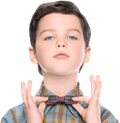WHERE TO GET THE BOOK: http://libgen.is/book/index.php?md5=F6B31A8DAFD6BD39A5986833E66293E6
People have been kind enough to link the audiobook in past posts, so hopefully they'll do that here, too.
CHAPTER ONE: WHAT IS AUTISM, REALLY?
In this chapter, Dr. Price discusses what the popular perception (read: stereotype) of Autism is, as opposed to what it actually is, and how it is just as much a social thing as it is a medical thing. How Autism often goes undiagnosed in people of color, women, gender nonconforming people, etc. He discusses the concept of neurodiversity and how it applies to ASD and ADHD people, AuDHD people, schizophrenics, BPD people, people deemed "low intelligence" or "low-functioning," etc. and how neurotypicality is not so much a described set of behaviors as an oppresive social ideal that literally everyone deviates from in some small way at least.
There's a heartbreaking passage in here where Dr. Price recounts his father tearfully revealing his cerebral palsy and seizure disorder to him as if it was a source of secret shame, how this is tragically rational because if he didn't hide it it might lead to losing his job or other forms of discrimination that disabled people of all stripes face. How avoiding a label can be a social asset in a world that deems you unfit for public life in many ways if you're labeled autistic. How even a late diagnosis can open you up to a world of new possibilities, and get rid of toxic shame you've had for a long time.
There's discussion of how the stereotype of Rainman Bazinga Sheldon 
 is tied into the roots of Autism's first descriptions in medical literature, and how Hans Asperger played a role in this with his eugenicist beliefs and willing cooperation with the Nazi regime to exterminate children dubbed Autistic (as opposed to "useful" ones that could be trained to fit in as a lower class of person -- essentially "Asperger's" meant you got to live) and how that harms minority Autistics, causing them to go undiagnosed or forcing them to mask in more fundamental, soul-crushing ways, to avoid social misunderstandings that can literally be deadly for them.
is tied into the roots of Autism's first descriptions in medical literature, and how Hans Asperger played a role in this with his eugenicist beliefs and willing cooperation with the Nazi regime to exterminate children dubbed Autistic (as opposed to "useful" ones that could be trained to fit in as a lower class of person -- essentially "Asperger's" meant you got to live) and how that harms minority Autistics, causing them to go undiagnosed or forcing them to mask in more fundamental, soul-crushing ways, to avoid social misunderstandings that can literally be deadly for them.
From there we get a medically and socially up-to-date definition and breakdown of what Autism is, a simple explanation of some of the neurobiology involved, the neurological markers like focus on details and diminished ability to prioritize and differentiate stimuli and delayed emotional processing, and the various medical, psychological, and social impacts Autism has on those who are Autistic. There's a lot in here on neurodiversity, intersectionality, how stereotypes were formed, how to start recognizing them as such. There's also a lot on how unfairly the medical community and especially health insurance treats neurodivergent people, and so on.
Most importantly, this is where Dr. Price first advocates for the notion of Autistic self-determination. He stresses "self-determination" or "self-realization" over "self-diagnosis" because of the social aspect of Autism, and promises to expand on this notion further, which indeed he does.
So, discussion questions:
- What did you think of this chapter? Is there anything new you learned? Anything that really activates those almonds, gets the noggin joggin'?
- Are there any passages that really stuck out to you? Something you think warrants deeper discussion or really crystallizes something you were struggling to express or share?
- Any certified "literally me" moments that touched you?


- Anything you hope to explore further in upcoming chapters?
Tag post to follow, plus my thoughts in another post.
Yay it's time! I've already finished the book but I'll ride along with you. This book really opened my eyes about everything in my whole damn life.
I really relate to Crystal's story. The only reason I've reached this point of self-realization, is because of an undeniable burnout that doesn't seem to be like "normal" burn outs. I graduated college in 2018 and have simply never recovered and have never been able to work full time (or at all, lately).
What's hard is that the rest of my family is some type of ND, but they all work (quite miserably, however). So I don't think they'll ever understand. In reality part of what burnt me out so badly was that I was trying to be like them. When Price spoke about his dad creating self-destructive defense mechanisms, it reminded me of both my parents. I think my dad is a big ball of compartmentalized dissociated fragments to numb his pain, and he fully bought into the fascist American Dream(tm) hustlegrind way of life. As a kid I looked up to him and wanted to be as hard working as him. When I got my first and only job, it was because my mom got it for me at her place of work. I worked alongside her and even in her shoes. She internalized the fuck out of everything (while my dad externalized it and behaved very selfishly) and basically took it upon herself to do everything perfect for everyone. Then she tried passing that onto me. Other coworkers would do a half-ass job, as you should. But if I ever did that, my mom would get mad at me because she genuinely felt like it was our responsibility to hold the whole place together (lol). She ended up giving me so much perfectionist anxiety. I just couldn't tough it out like they could. I really tried, but I couldn't. Just trying to get up early in the morning every day and work 8 hours, which my parents have done every single day of their lives for their entire adult lives - made me want to unalive myself. I genuinely did not want to be around anymore if it meant my life was going to be one long miserable exhausting slog. But yet they've done it. So it fills me with shame that I can't even do the most basic of "adulting" that they can. It's hard for them too, isn't it? So why can't I do it? And it fills me with fear, too, that I won't be able to keep up my low-key lifestyle forever, and will be forced into an unsustainable burning situation (where everyone around you is going to say you're being dramatic/get over it, like that girl crying on TikTok about work life). I'm kind of stuck atm, desperately hoping I can be a housewife or something because I can't see myself functioning like you're "supposed" to. My mom tells me I just need to see a therapist but there aren't any that would get it. When I filter for autism in my search results all I get are people who assess children. Sigh.
But then it's like, okay say if I get assessed, then what? It's not like ABA would be of any use to me. I can try to get on disability but that's hard af and could take years and if I get married it might go away anyway. What's the point? I'm an adult and you're just expected to help yourself. So that's what I've been trying to do, through reading books and trying to listen to my body. I'm hoping that others understand. I don't think my mom likes me to think of myself as disabled, but that's probably because it would mean she has to reckon with herself being disabled too (which she is lol).
Also yeah the fact that it all started with that Nazi collaborating Asperger guy plus the guy who invented gay conversion therapy.... I'm not sure if it would have even helped me if I was diagnosed as a kid. ABA would have basically just been a legalized form of torture, moreso than just regular public school is already torture to kids like us. Either way you've got some form of PTSD. Yay? :|
And I agree too with the underreactive-overreactive brain thing. I think the key to defining autism is the "spiky profile". Really strong points, really weak points. What those are can vary massively but the point is that the profile is spiky like that. And how disabled you are by it, depends on where your weaknesses are and how they affect your daily life. It's probably a better way to look at it than "level 1, 2, 3", "high-low" or whatever.
Spiky profile is a good way to conceptualize it. My sensitivity to noise and bright/flashing lights can be deeply upsetting emotionally but not debilitating, I'm incredibly good at reading and comparing sets of text. I am completely fucking clueless and clumsy as fuck in any social situation and missing the finer points of social interaction is deeply alienating for me. Very few texture/taste/pressure triggers for me, but those that do really set me off hard. Tried a weighted blanket once, immediately started panicking and threw it off. Can stand most unpleasant flavors and smells but raw celery makes me gag and lots of perfumes send me into a low-level sensory meltdown. Generally speak in an annoyed-sounding monotone when I'm speaking for myself, but have excellent vocal control and mimicry and can rattle off a script with all sorts of appropriate embellishment and emotive tone. Peaks and valleys.